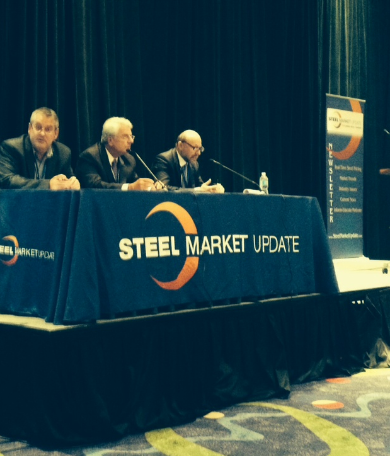Prices

September 7, 2014
Steel Summit Debate on Imports
Written by Sandy Williams
Are foreign steel prices too low or are US steel prices too high? That is a question faced by trade litigation attorneys Robert Schagrin and Lewis Leibowitz at the recent SMU Steel Summit conference in Atlanta. There is a $300 delta between China and US prices and a $200 delta between Europe and the US prices. The consensus by attendees at the conference seemed mixed depending on their industry focus.
Schagrin and Leibowitz are frequent combatants on opposite sides of trade cases submitted by the US steel industry. Schagrin argues on the side of the petitioners while Leibowitz defends the interests of steel consumers and international producers. Following historical background presented by Paul Lowrey, Managing Director of Steel Research Associates, the attorneys offered their perspectives on steel imports and the impact trade cases have on the industry.
Although the recent OCTG duties placed on six countries primarily targeted Korea, past cases have successfully restricted OCTG imports from China and there is a potential new trade case on Chinese flat rolled looming in the near future.

Steel products make up 42.7 percent of all AD/CV orders according to Leibowitz. Anti-dumping and countervailing duties against China include seven pipe and tube products, cut-to-length plate, and hot-rolled steel, said Schagrin.
Due to the 250 million tons of government subsidized steel overcapacity in China depressing prices in Asia, Asian countries would rather export to the United States rather than sell to their own countries, remarked Schagrin. Other countries are scared of China and don’t press cases against the Chinese manufacturers.
Schagrin finds the prevailing attitude is, “Our government doesn’t want us to mess with the Chinese. The Chinese just play hardball. They aren’t like us, we play softball with everybody. They play hardball.”
“The Chinese government has a lot more in common with the Mafia in Italy and the United States, than they do with a democratically elected government,” commented Schagrin.
Regarding the relief on OCTG imports from Korea and five other countries, Schagrin pointed out that Korean imports of OCTG skyrocketed from half a million tons in 2010 to 1.5 million tons in 2014. OCTG imports from all other countries dropped from a high of 2.5 million in 2012 to around 2 million tons in 2014.
US capacity for OCTG was around 4 million tons in 2012 with 4-5 million tons of demand. Demand is now around 7.5 million tons with 5.5 million tons of capacity, said Schagrin, with a possible increase to 8.5 million tons of capacity and 8 million to 10 million tons of OCTG demand. It is hard to see what would slow the growth said Schagrin, noting that imports are taking a lot of the increase in demand in the US.
Schagrin said he thinks South Korea imports will continue but at higher prices which is the intended result of the anti-dumping suits. The idea that companies will decided to drill less wells because of the price of OCTG, and thereby result in less downstream jobs, is “unadulterated bullshit.”
Although there have been successful trade cases against Chinese imports, Schagrin says “even when you win against the Chinese the Chinese make sure you don’t win. What they do, with the direct assistance of their government, is create a whole network of transshipment providing a fake country of origin for their products.”
According to data provided by Schagrin, 30 freight forwarding companies, all licensed by the government, advertise on the Chinese web that they will “create these false country of origin for certificates for your products and make sure you won’t have to pay countervailing or antidumping duties … for anywhere in the world.”
“The government of China is sponsoring worldwide criminal activity,” said Schagrin.
He concluded his remarks by saying that the industry needs to “be active and do something in the World Trade Organization, or other forums, to get rid of government subsidization of uneconomic excess capacity.”
Lewis Leibowitz began his commentary with reference to the recent decision in the OCTG case in which the International Trade Commission found injury.
“In response to that, Mario Longhi, the CEO of US Steel–by the way an imported CEO–said any countervailing and anti-dumping duty restrictions on OCTG will make a more competitive market for the US. Well for whom? The people who buy OCTG steel have a less competitive market, clearly, which is why the case was filed.”
Leibowitz referred to the steel industry as one of the “four sacred cows in the US that use AV/CD to restrict trade.”
What is called “unfair trade, especially dumping, but also subsidies, are not illegal,” said Leibowitz, “And, in many respects, are not unfair.”
Leibowitz said initiators of trades suits don’t care about consumers and they don’t consider the impact of AD/CV orders. “Where Roger and I most disagree is not about the facts, but about the consequences of doing or not doing certain things.” Leibowitz said his clients tend to be the domestic consumers, international producers and facilitators of products (like steel fabricators and distributors) and their concerns are not considered in these laws.
Duties imposed on products are arbitrary said Leibowitz. “The Commerce Department, which calculates the duties doesn’t have subpoena power, so they punish people for not doing everything they want, exactly as instructed, in a timely way. So that is why a lot of companies fail those tests and they get elaborately inflated duties.” He noted that South Korea, a producer of OCTG that does not use the products domestically, was arbitrarily judged on profits of pipe producers in Argentina.
“The United States, alone among the major traders of the world,” said Leibowitz “doesn’t tell you what the duty is. They make you make a deposit, an estimated amount, and they calculate the duties a couple of years after the fact.” The result is importers stop importing because the risk is too great—a calculated outcome of trade laws.
Korea is a very efficient producer of steel including Oil Country Tubular Goods, said Leibowitz, and they routinely have very low anti-dumping margins and virtually no subsidy margins.
“Korea got a negative preliminary finding by the Commerce Department because they simply weren’t dumping. Their costs were lower and the prices they were charging were good. They were building a better mousetrap. “
“There is a mythology of unfair trade,” said Leibowitz. “Dumping sounds bad. It sounds like you threw polluted garbage in your stream out back. Dumping is not that. Dumping is not illegal. In fact, the only World Trade Organization rules about antidumping are those which restrict governments in what they can do, the processes they have to impose them, because obviously they negate the reduction of trade barriers that are at the core of the WTO.”
The US is singled out as the most frequent violator of those rules when they impose anti-dumping duties said Leibowitz.
“Protectionism doesn’t work, that is why we don’t do it anymore, it doesn’t work. If you bury your neighbor the whole global economy suffers.
In closing Leibowitz said, “We need to consider the interests of everyone else in the economy. Steel is a critical product but we need to recognize that trade benefits us. Why do you suppose we impose export prohibitions on countries that we are in conflict with? Is it because export controls make us stronger or is it because imports can make the other guy stronger? Imports make the other guy stronger.”
“If you don’t have a seat at the table, and consumers don’t, you are probably going to be under it.”







